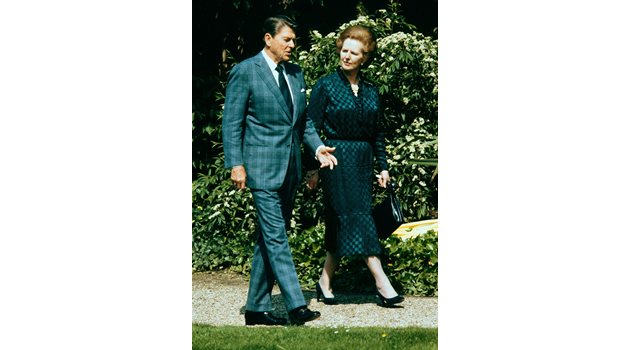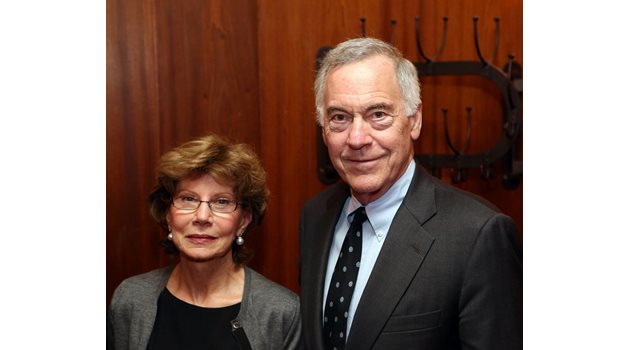Prof. Steve Hanke: Reagan would be doing exactly the opposite of what President Biden is doing
I believe that Reagan would have taken the diplomatic high road: one was President Kennedy’s Berlin settlement of 1963 with First Secretary Khrushchev, and another was President Reagan’s negotiations with First Secretary Gorbachev as the Soviet Union peacefully drew its last breath, said Prof. Hanke
Steve H. Hanke is a professor of applied economics at the Johns Hopkins University in Baltimore. He was President Petar Stoyanov's Chief Advisor from 1997-2002. He is known as the "Father of Bulgaria's Currency Board.”
- Prof. Hanke, you worked with President Reagan when he successfully negotiated the peaceful dissolution of the USSR. You must be wondering, how would President Reagan have handled the Russia-Ukraine problem?
- That is a very complex question. It is also a question we will never know the answer to. But, I will speculate based on my close observations of Reagan at work and how I might have advised him.
As a backdrop, Reagan’s favourite farewell speeches by former U.S. presidents were those by George Washington (1796) and Dwight D. Eisenhower (1961). It is interesting that both men were not only U.S. presidents, but U.S. generals who knew first-hand the vicissitudes and cruelties of war. Washington’s main message was in two sentences: “The great rule of conduct for us in regard to foreign nations is, in extending out commercial relations, to have with them as little political connection as possible.” And: “It is our true policy to steer clear of alliances…” Washington correctly concluded that alliances are nothing more than conveyor belts for wars.
The main message in Eisenhower’s speech, which was drafted by his chief speechwriter Malcolm Moos, a professor at the Johns Hopkins University, was a warning contained in one sentence: “In the councils of government, we must guard against the acquisition of unwarranted influence, whether sought or unsought, by the military-industrial complex.” In short, Eisenhower did not trust either the military or the weapons industry.
With this background of principles, I think Reagan would have attempted to diffuse the Russia-Ukraine time bomb with a formal agreement in which Ukraine was deemed to be off-limits for NATO expansion—a sort of neutralist solution, or an update of the 1963 settlement hammered out between President Kennedy and First Secretary Khrushchev.
The second element in such a defusing, neutralist settlement would prohibit outside parties from meddling in internal politics. Under such a settlement, there would not have been an Orange Revolution or a Murky Maidan Revolution. It is worth noting that the idea of “making the world safe for democracy” is a post-World War I U.S. mantra, one designed by President Woodrow Wilson. As Mrs. Hanke and I documented in a 2011 issue of the French review Commentaire, the word “democracy” does not appear in the U.S. Declaration of Independence or in the U.S. Constitution. The Founders of the United States were, in fact, quite fearful of any kind of tyranny, including a tyranny of the majority imposed by popular democracy.
- But, what if the Russia-Ukraine bomb could not be defused and Reagan was faced with the current war in Ukraine?
- I think Reagan would be doing exactly the opposite of what President Biden is doing. Biden has made a mess of the economy, and as a result, his poll numbers are very weak. He is an unpopular president. There are midterm congressional elections coming up in November of this year, and Biden’s political party, the Democrats, are projected to incur heavy losses and lose control of the Congress. Biden’s political calculus is that a foreign policy victory, such as a military victory over Russia in Ukraine, might improve the Democrats in the 2022 midterm elections. As a result, Biden is ramping up the war effort and taking an aggressive, undiplomatic stance.
I believe that Reagan would have taken the high road. As I recounted, the U.S. had two powerful examples of the diplomatic high road: one was President Kennedy’s Berlin settlement of 1963 with First Secretary Khrushchev, and another was President Reagan’s negotiations with First Secretary Gorbachev as the Soviet Union peacefully drew its last breath.
Diplomacy at the highest level was their method. It saved them and us, and it could now save us from the monstrous expenses being incurred to purchase weapons of war, the financial and social costs of the humanitarian catastrophes ricocheting throughout the world, the massive disruptions in markets and associated commodity prices, and, most importantly, an unknown number of deaths.
As a Great Power, the United States can afford diplomacy.

- In your last answer, you mentioned the surge in commodity prices that has been caused by the war in Ukraine. What are your views about what is provoking commodity inflation and inflation in general?
- General inflation is always and everywhere a monetary phenomenon. In short, inflation raises its ugly head when the proverbial printing presses run too fast. Just consider the U.S. with the arrival of the pandemic. The Biden administration began to spend money recklessly. That created a huge government deficit. Over 90% of the deficit was financed by the Federal Reserve, creating money out of thin air. As a result, the increase in the money supply, broadly measured by M2, since February 2020 has been about 41%. That amounts to an average annualized rate of 18.7%, a rate of growth that is much, much higher than the 5%-6% annual rate that would allow the Federal Reserve to hit its inflation target of 2% per year. It does not take a rocket scientist to see that the growth rate in the money supply has been three times higher than it should be. The excess money fuels inflation, which is now 8.5% per year, the highest inflation in 40 years.
As for the commodity price surges, they represent changes in relative prices. For example, oil prices over the past two years have gone up and have gone up more than prices for most other items. But, these relative price changes do not directly cause the overall level of inflation to increase on a sustained basis. The overall increase in inflation is always and everywhere the result of excess money being injected into the economy.
To illustrate my point, consider the two oil price shocks of the 1970s in Japan. The first shock was in 1973-74. World oil prices surged, and so did overall inflation in Japan, as well as in many other countries. Most people concluded that the increases in overall inflation rates were caused by oil prices going up. No. The increase in inflation was caused by an acceleration in the growth of the money supply in Japan. The picture becomes clear when we look at the second oil shock in 1979-80. Oil prices increased in Japan, but overall inflation did not change too much because the growth rate in the money supply didn’t change too much.
We are witnessing increases in the overall inflation rates in many countries and monetary zones. For example, U.S. inflation is at 8.5% per year, and Eurozone inflation is at 7.4% per year. Those elevated rates are due to the excess money created since the pandemic, not because certain prices, like oil, are going up relative to other goods and services.
































